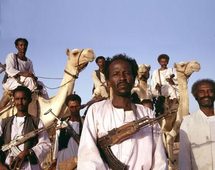Arab nomads settling in contested Sudan region: official
Guillaume Lavallee
KHARTOUM, Guillaume Lavallee- Members of an Arab nomadic tribe are settling in a contested region straddling north and south Sudan, hoping to vote in a referendum next year that will define its status, a Sudanese official said on Sunday.
Members of the Misseriya tribe, who are accused by southerners of being close to the Khartoum government, are said to be moving into parts of Abyei, the chief administrator of the region Deng Arop Kuol told reporters in the Sudanese capital.

"It is the Misseriya who are settling in those areas. The target is to settle in 20 locations in the area north of Abyei and they already started to settle in those areas now," he said.
"We are getting information that they intend to settle 25,000 families in those areas and the number of people will go up to 75,000 in those areas. We believe it is something organised," Kuol added.
As south Sudan holds its referendum on independence in January, residents of the oil-rich Abyei region will simultaneously vote on whether they want to belong to north or south Sudan.
Abyei's referendum law gives the right of vote to members of the southern Dinka Ngok tribe and it is up to the referendum commission to decide which "other Sudanese" are considered residents of the region and can therefore vote.
The law has angered the Arab Misseriya -- a nomadic tribe that migrates each year to the Abyei region looking for pastures for their cattle -- because it does not guarantee them voting rights.
The referendum commission for Abyei has not yet been formed, because representatives of north and south Sudan have failed to agree on who will head it -- leaving the question of Misseriya eligibility still open.
"The Misseriya... are in no way meant to vote in the Abyei referendum because they are not residents. They are meant to be nomads," said Kuol.
Deadly clashes in May 2008 in Abyei had raised fears of a return to civil war between north and south Sudan. Both parties decided to take the matter of the sensitive border to arbitration in The Hague.
Last year, the Permanent Court of Arbitration based in The Hague refined the borders of Abyei, leaving the Heglig oil fileds out of the Abyei region, the heartland of the Dinka Ngok.
Both north and south authorities had accepted the ruling, which was criticised by the Misseriya.
The Hague decision was not "fair" and "definitive" and has not enabled both parties to resolve their differences, said Salah Cos, adviser to President Omar al-Bashir for security matters, in a statement over the weekend.
Sudan produces 500,000 barrels of oil per day and has reserves estimated at six billion barrels.
Most of it lies on the border between north and south.
-------------------------------------------------------------------------------------